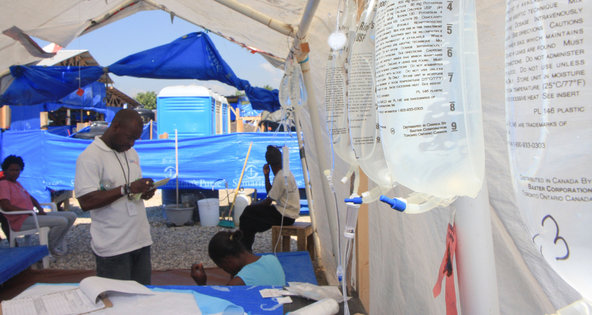 Baxter International, via Business WireIntravenous solutions made by Baxter International were donated in Haiti.
Baxter International, via Business WireIntravenous solutions made by Baxter International were donated in Haiti.
Baxter International is in talks to buy Gambro of Sweden for about $4 billion, people briefed on the matter said on Friday.
A deal for Gambro would help bolster Baxter’s lineup of dialysis products. The Swedish company focuses on equipment that is used in hospitals and other medical facilities. Baxter, which has headquarters in Deerfield, Ill., makes treatments for a number of diseases, including hemophilia, immune disorders and infectious diseases.
Any deal is still at least two weeks away, and the talks may still fall apart, these people cautioned.
Founded in 1964, Gambro has about 7,500 employees and production facilities in nine countries, according to the company’s Web site. It was acquired by two Swedish investment firms, EQT and Investor AB, in 2006 for about $4.7 billion. Last year, Gambro sold its Caridian BCT unit to Terumo of Japan for about $2.6 billion.
A takeover of Gambro would be Baxter’s biggest deal ever. The medical products maker is no stranger to acquisitions, having struck eight in the last two years, according to Standard Poor’s Capital IQ. But its largest deal to date was a roughly $700 million purchase in 1997.
Baxter has plenty of firepower to buy Gambro; it reported $13.9 billion in sales and $2.2 billion in profit last year, and had $3.2 billion in cash as of Sept. 30.
Shares in Baxter rose 4 percent in trading on Friday, to $68.81, after The Wall Street Journal reported news of the talks. At that level, the company is valued at about $37.8 billion.
A Baxter spokeswoman wasn’t immediately available for comment. A representative for Gambro declined to comment.
Mark Scott contributed reporting.
A version of this article appeared in print on 11/24/2012, on page B2 of the NewYork edition with the headline: Baxter Said To Talk With Gambro About a Takeover.
Article source: http://dealbook.nytimes.com/2012/11/23/baxter-international-said-to-be-in-talks-to-buy-gambro-for-4-billion/?partner=rss&emc=rss